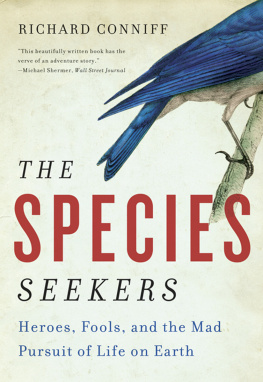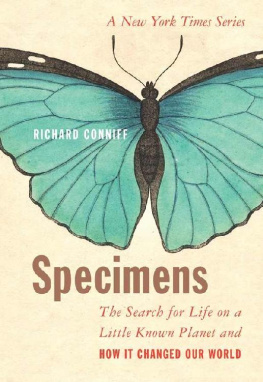The Devils Book of Verse: Masters of the Poison Pen from Ancient Times to the Present Day (editor)
The Ape in the Corner Office: How to Make Friends, Win Fights, and Work Smarter by Understanding Human Nature
Swimming with PIRANHAS at Feeding Time
My Life Doing DUMB STUFF with Animals
Richard CONNIFF
W. W. NORTON & COMPANY
New York | London
Copyright 2009 by Richard Conniff
All rights reserved
For information about permission to reproduce selections from this book, write to Permissions, W. W. Norton & Company, Inc., 500 Fifth Avenue, New York, NY 10110
Production manager: Devon Zahn
Library of Congress Cataloging-in-Publication Data
Conniff, Richard, 1951
Swimming with piranhas at feeding time : my life doing dumb stuff with animals / Richard Conniff.
p.cm.
Includes bibliographical references.
ISBN: 978-0-393-07153-5
1. Dangerous animalsAnecdotes. 2. AnimalsAnecdotes. 3. Conniff, Richard, 1951Travel. I. Title.
QL100.C66 2009
590dc22
2008051234
W. W. Norton & Company, Inc.
500 Fifth Avenue, New York, N.Y. 10110
www.wwnorton.com
W. W. Norton & Company Ltd.
Castle House, 75/76 Wells Street, London W1T 3QT
For Karen, who had the sense to stay home
Swimming with PIRANHAS at Feeding Time
Preface
W hen Im heading off to report a story, people often say, Youre going where ? Youre going to do what ? After a little while, doubtfully, they add, And somebodys actually paying you for this? Then they ask if they can come along. No editor or producer has ever posted a job description explaining what they employ me to do. But in my dreams it would look like this:
HELP WANTEDWRITER TO TRAVEL
Applicant must be willing to visit the farthest, wildest, most strange, and sometimes beautiful places on Earth, and try almost anything once. You will never have to wear a business suit, and Human Resources will not know your identity. Meals are provided and may include giraffe jerky, warthog sausage, and an occasional side of beetle larvae.
Pay will vary. (Translation: Not much, or if possible less.) The employer does not provide medical insurance or any pension. On the other hand, all reasonable expenses will be covered. OK, yes, that will include the mud-walled hotel in western Uganda with one toilet serving all rooms. And, OK, its not really a toilet, but a hole in the floor. And yes, yes, yes, you may experience near total liquefaction there in the form of the week-long gastrointestinal calamity called giardia. But could we get back to our requirements, please?
Must love animals. The candidate will travel on foot with !Kung San hunters stalking a leopard up a rocky canyon in Namibia while earnestly hoping that the leopard is not, in fact, stalking themsomething leopards do much better even than !Kung San hunters.
The candidate will sit down in open country and commune with a pack of African wild dogs. Disregard that rumor about their being vicious man-eaters. Theyre sweethearts. Honestly.
Willingness to shed conventional norms a requirement. The candidate must be able to contemplate in a nonjudgmental way even the animals that happen at the moment to be having sex, possibly incestuous, on his forehead.
Familiarity with the scientific method a plus. You will at times, for instance, want to fling carefully weighed chicken carcasses into various piranha-infested bodies of water, and time how long it takes to reduce them to bone fragments and pin feathers. Does this feel like a nice day for a swim?
Occasional loneliness is a hazard of the work. The ability to say, Bartender, Id like another, please, in as many languages as possible will be an invaluable tool in your chosen profession.
Diplomatic skills a plus. Should you be traveling on the Rwanda border at a time when a local warlord is offering $1,000 for the head of an American, and should your inebriated British travel companions begin loudly singing The Star Spangled Banner when you approach, feel free to mutter, O! Les cochons Amricains! while moving rapidly in the opposite direction.
For our ideal candidate, this job offers moments of sublime beauty most people only get to dream about. Flying low and slow down the Rio Grande in a 50-year-old Piper Cub, for instance, you will have roseate spoonbills on your wingtips, sleek and lovely, in the afternoon sun, as winged flowers. In the llanos of Venezuela, the egrets will cluster in the trees along a marsh causeway like bright white Christmas ornaments, rising up in clouds as you approach and settling down behind as you pass by. You will wake up one morning in the Himalayas to find clouds traveling in a vast numinous river down a high mountain valley and tumbling over a precipice into the abyss, like a waterfall of angels.
You will feel at such moments like the luckiest person on Earth.
Is this a life you would care to pursue? Are you our ideal candidate?
Additional details follow below.
RICHARD CONNIFF
June 30, 2008
Wild Dogs
S omewhere deep in Botswanas Okavango Delta, a million miles from nowhere, a dog named Nomad leads his pack on a wild chase through the bush. The sun paints a gaudy orange stripe across the horizon. Night threatens at any moment to rush down and set the leopards afoot. Our Land Rover bucks and jumps through a dense thicket of mopane trees, and then breaks out onto a flood plain through the catpiss smell of windshield-high sage. Giraffes and tsessebe scatter ahead of us, kicking up panicky clouds of dust. Nomad is the orphan child of a male named Chance and a bitch named Fate, and maybe more sensible men would take the hint and give up, go home, get dinner.
The driver, a wildlife biologist named John Tico McNutt, spots a herd of impala, fast food for the wild dogs we are following. But there are no dogs in sight. He listens to his earphones for the signal from Nomads radio collar, and then the Land Rover dives back into the forest. Uh-oh, McNutt says, as he muscles the wheel one way and then the other through a thicket of obstacles. Uh-oh. He circles a tree once to get his bearings, and then lurches off in the direction that makes his earphones ping strong as a heartbeat. Thorny acacia branches howl down the sides of the truck and leap in at the open windows. A rotten log explodes under our tires, showering us with debris. Captain, weve been hit! McNutt reports and guns the engine.
And then we see the dogs out ahead of us, long-legged and light-footed, seeming barely to skim the ground as they hunt. They stand about 2 feet tall at the shoulder, mottled all over with patches of yellow, black, and white. Their ears are round as satellite dishes, and their mouths are slightly open. Everything about them as they glide through the mopane seems effortless. Then they vanish, dappled shadows moving among the dappled shadows of dusk.
The common nameAfrican wild dogsis unfortunate, suggesting house pets gone bad. In fact, Lycaon pictus, the lone species in its genus, is utterly wild and only distantly related to our domestic dog or any other canid. Wild dogs most closely resemble wolves in their social behavior, though they are smaller and more gentle. They are like wolves, too, in that humans have vilified and persecuted them into extinction over most of their range.








